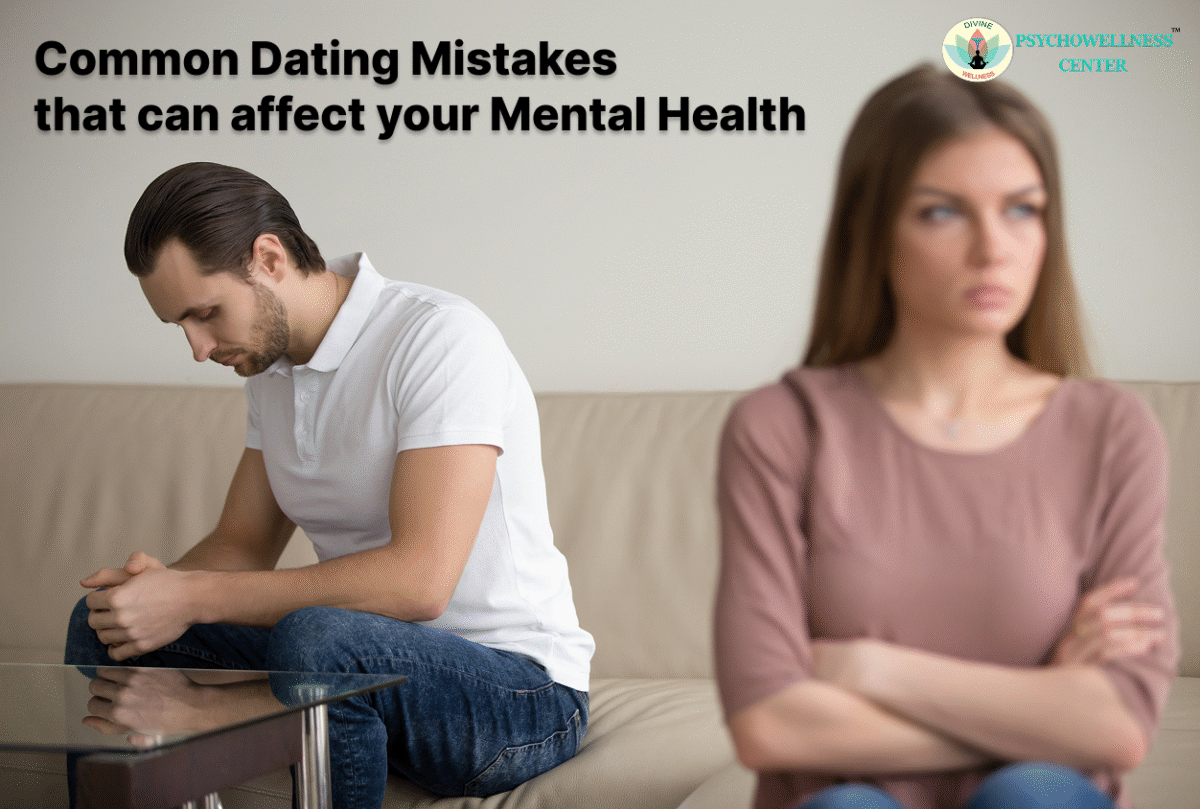Dating can be an exciting and fulfilling journey, but it also has the potential to impact your mental health positively or negatively. In the pursuit of love and connection, people sometimes fall into psychological patterns that can lead to anxiety, depression, low self-esteem, and emotional burnout. By understanding these common dating mistakes and the psychology behind them, you can cultivate healthier relationships and protect your mental well-being.
- Ignoring Your Attachment Style
People with anxious attachment may cling to partners and fear abandonment, while those with avoidant attachment may pull away when intimacy grows. Failing to recognise and address your attachment style can lead to repeated relational patterns and emotional instability.
Tip: Reflect on your early relationships with caregivers. This can provide insight into your attachment behaviours. Therapy or reading books like Attached by Amir Levine can help deepen this understanding.
2. Confusing Chemistry with Compatibility
It’s easy to mistake strong emotional arousal (like butterflies or excitement) for true compatibility. This mistake often results in staying in relationships that lack fundamental values, goals, or emotional safety.
Psychological Insight: Intense chemistry can sometimes be linked to unresolved childhood trauma.
Tip: Focus on emotional safety, communication, and shared values rather than relying solely on passion.
3. Seeking Validation Instead of Connection
When dating, many people seek external validation to boost their self-worth. While compliments and affection can feel good, relying on a partner to regulate your self-esteem can become a psychological trap. The danger lies in outsourcing your emotional needs rather than developing self-compassion and internal confidence.
Psychological Impact: This pattern can contribute to co-dependency, where one person loses their sense of self in the relationship.
Tip: Prioritise self-validation through journaling, mindfulness, or therapy. Ask yourself: “Would I still feel secure if this person were not around?”
4. Avoiding Honest Communication
Avoiding difficult conversations due to fear of conflict or rejection is a common dating mistake that can lead to emotional suppression, resentment, and mental exhaustion.
Psychology Connection: Avoiding vulnerability is often a defence mechanism to shield against emotional pain or rejection.
Tip: Practice assertive communication—being honest while respecting your partner’s feelings.
5. Ignoring Red Flags and Violated Boundaries
Ignoring early signs of toxic behaviour—like controlling tendencies, dishonesty, or gaslighting—can have severe consequences on your mental health. Gaslighting, a manipulation tactic that causes you to doubt your reality, is particularly harmful.
Long-term Effects: Staying in such relationships can lead to chronic stress, low self-worth, and even post-traumatic stress disorder (PTSD).
Tip: Trust your instincts. If something feels wrong, explore it. Having clear emotional boundaries and a list of non-negotiables can protect your mental health.
6. Rushing Into Emotional Intimacy
Quickly becoming emotionally intimate without establishing trust can be a recipe for disappointment. Known as emotional flooding, this often leads to a crash when the intensity fades or unmet expectations surface.
Cognitive Distortions: You may fall into black-and-white thinking, assuming the person is either “perfect” or “a disappointment” based on early interactions.
Tip: Practice emotional pacing. Give the relationship time to develop. Let trust grow naturally through shared experiences and consistent behavior.
7. Overanalyzing and Overthinking
Rumination—obsessively thinking about past interactions or trying to “decode” messages—can lead to anxiety and emotional exhaustion.
Mental Health Impact: Overthinking activates the amygdala, your brain’s fear center, causing chronic stress and sleep disturbances.
Tip: Challenge cognitive distortions like “mind reading” and “catastrophizing.” Ground yourself in facts, not assumptions.
8. Settling Due to Fear of Being Alone
Staying in an unfulfilling or harmful relationship due to the fear of loneliness is a common mistake. This can stem from low self-worth and a scarcity mindset—the belief that love is rare or that you’re not “enough” on your own.
Psychological Cost: This leads to emotional stagnation, anxiety, and even depressive symptoms from staying in misaligned relationships.
Tip: Learn to enjoy your own company. Learn hobbies, nurture friendships, and build your self-identity.
9. Not Doing Inner Work Between Relationships
Jumping from one relationship to another without taking time for self-reflection or emotional healing often perpetuates the same unhealthy cycles. Dating without intention can become a form of escapism.
Psychological Insight: Avoiding introspection prevents the processing of past traumas or unmet emotional needs.
Tip: Take time to reflect on what worked, what didn’t, and how you’ve grown.
Conclusion
Dating can bring immense joy, but when approached without self-awareness, it can also negatively affect your mental health. Recognising these common mistakes—and understanding the psychological principles that underlie them—empowers you to cultivate meaningful, emotionally healthy relationships. Incorporate emotional intelligence, self-awareness, and healthy boundaries into your dating life.
If you find yourself struggling with patterns like low self-esteem, anxious attachment, or emotional burnout from dating, seeking professional guidance can make a significant difference. TalktoAngel, an online counseling platform, connects you with qualified psychologists, therapists, and relationship counselors from the comfort of your home. Whether you’re navigating heartbreak, building better relationship habits, or working on your emotional well-being, TalktoAngel provides accessible, confidential support tailored to your needs.
If you’re looking for the “best psychologist near me,” schedule an appointment at the Psychowellness Centre in Janakpuri or Dwarka by contacting 011-47039812 or 7827208707. The TalktoAngel platform also assists clients seeking the ease of online treatment tailored to their emotional requirements. Remember, you don’t have to go through it alone—help is just a click away.
Seek guidance from Dr. R.K. Suri, a prominent clinical psychologist and life coach, along with Ms. Mansi, a well-known counseling psychologist.
References
- Bowlby, J. (1988). A secure base: Parent-child attachment and healthy human development. Basic Books.
- Linehan, M. M. (2015). DBT skills training manual (2nd ed.). Guilford Press.
- Taitz, L. (2012). The self-compassion diet: A step-by-step program to lose weight with loving-kindness. HarperOne.

